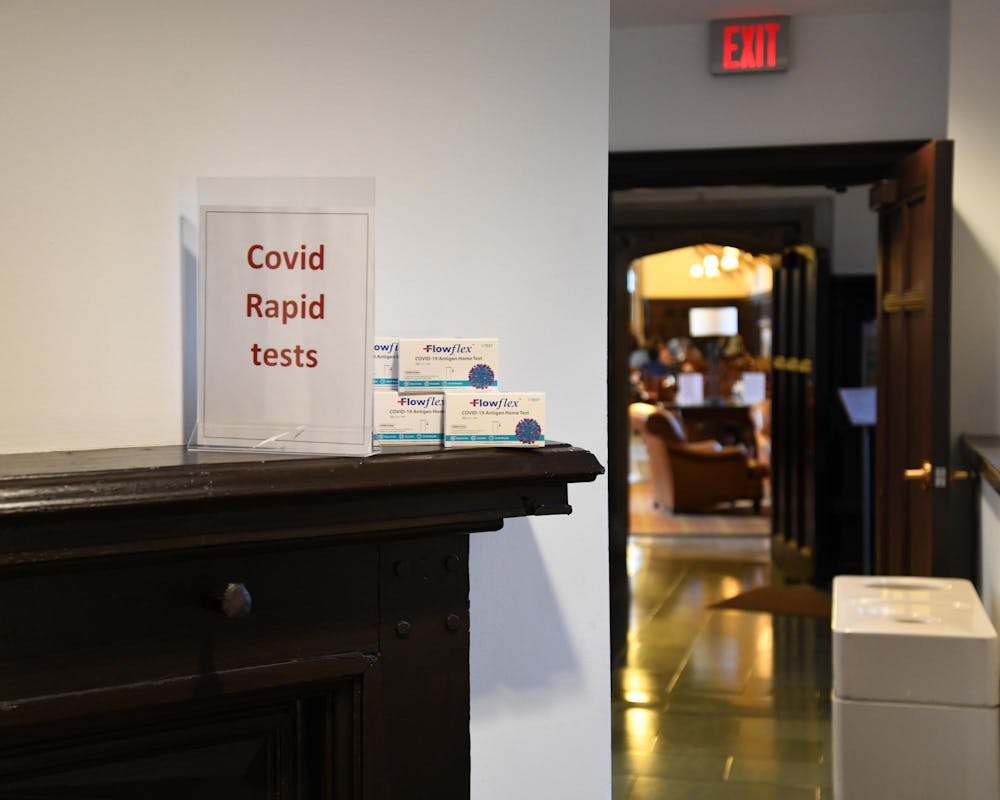My roommate and I missed the first three days of the second week of classes due to COVID-19 isolation. Left hungry by the inadequate portions of isolation meals, we relied on the generosity of friends who brought us, among other things, a jumbo-sized jar of peanut butter, miso soup, and gummy bears. We were sick and exhausted, and our capacity to keep up with Princeton’s academic rigor was severely diminished. We worried that spending five days out of the social loop and missing our first Lawnparties would cause our burgeoning friendships to stagnate. The immense cumulative setback of missing a few classes means we’re still catching up on work.
Some of these problems were inevitable, but others were preventable. The current consequences of testing positive for COVID-19 are severe. Indeed, Princeton’s lack of accommodations for those infected with COVID-19 is ultimately discouraging students from testing, leading to even greater spread on campus. If the current policies were improved by providing more resources to infected students, more symptomatic students would test, reducing the length of this surge and minimizing further interruptions to the semester.
The University could begin to help mitigate the spread of COVID-19 on campus and take better care of students by allocating more isolation spaces for infected students or alternative spaces for their healthy roommates. Currently, the University offers no support for roommates of students with COVID-19, instructing them to either stay with a friend or risk infection by staying in their dorm. This is especially difficult for first-year students, who are already navigating the struggles of managing their own healthcare for the first time and might not feel comfortable asking to stay with newly established friends. For upper- and underclassmen alike, however, the burden of responsible isolation rests on the student — a difficult burden considering the close living quarters with which we are provided. The University’s failure to provide resources for roommates can provoke resentment between friends and roommates, and detrimentally impact students’ living situations. Students are disincentivized from testing when the University neglects the most rudimentary needs of those in isolation. When the consequences of a positive test are so high, students might not want to take the risk.
In addition to the social and personal implications of COVID-19 isolation, the academic ramifications of missing several days of class can be extreme. Right now, determining accommodations for sick students is up to the discretion of each professor. Only some classes offer Zoom links or pre-recorded lectures, and varying degrees of flexibility among professors means that a five-day isolation period can have drastically different effects for each student. In order to remedy this inequity, there should be a standardized approach to COVID-19 isolation, and the University should heavily encourage individual departments to provide a Zoom option. Students would feel less apprehensive about taking a COVID-19 test if they knew there were measures in place to allow them to continue to participate in class from their rooms.
Life at Princeton moves at a breakneck pace; missing five days here feels like missing three weeks anywhere else. Many symptomatic students reluctant to test for COVID-19 cite fear of falling behind, should they test positive and be required to isolate, as a primary deterrent. One student I spoke to who exhibited COVID-19 symptoms but chose not to test explained her rationale, stating “I’m going to live in dangerous denial … I don’t want to miss class.”
Additionally, the University’s lack of transparency on COVID-19 cases exacerbates confusion. Even though cases have declined over the past three weeks, the predominance of unrelated viruses on campus creates a sense of alarm. The University’s public COVID-19 dashboard, which tracks cases on campus, hasn’t been updated since June 7, 2023. While widespread resistance to testing could affect the efficacy of a case counter, the presence of such a dashboard could empower students to take appropriate precautions. Additionally, students who are ambivalent about testing might be reassured by the knowledge that if they do test positive, they won’t be alone. Clearer information would combat the stigma surrounding what is already a controversial issue on campus.
While the University can’t penalize students who don’t test or report positive results, violating the terms of COVID-19 isolation can precipitate serious consequences, including civil action, according to the letter from Global and Community Health sent to students who submit positive test results. If the University implemented the above recommendations for COVID-19 accommodations and demonstrated a clear commitment to alleviating the struggles of isolation, more students would decide that the moral imperative of testing when symptomatic outweighs the unique challenges of missing five days at Princeton.
Frances Brogan is a first-year intending to major in the School of Public and International Affairs. She can be reached at frances.brogan@princeton.edu.





